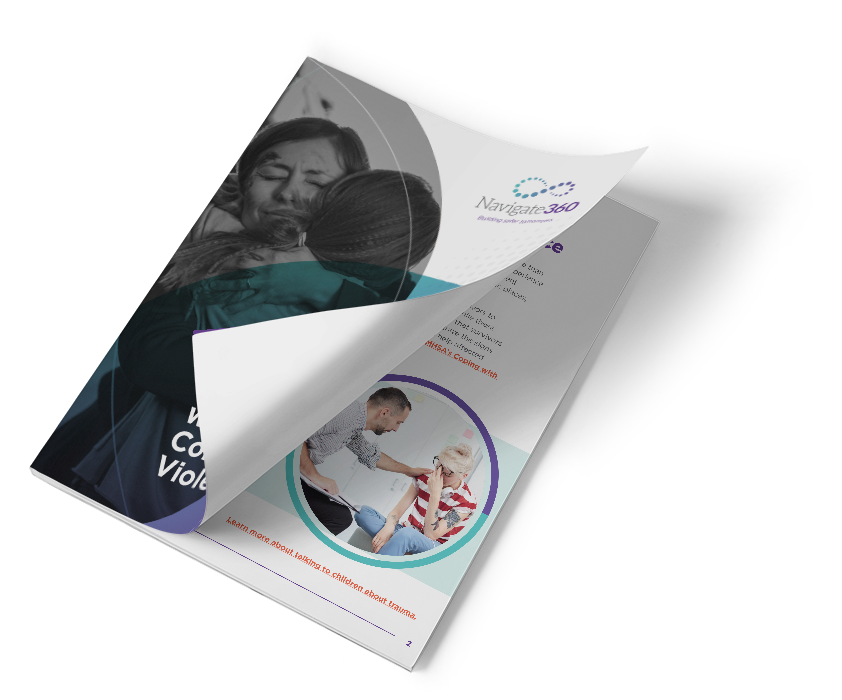Survivors
Ways to Cope with Grief After Community Violence
Experiencing violence in the community can be traumatizing for more people than those who were directly involved. Those who witnessed the incident can experience trauma, as can other members of the community in which the violent incident occurred. Examples of community violence can include shootings in public places, gang-related fighting, riots and more.
After surviving or witnessing such a traumatic event, it’s likely for survivors to experience a range of emotions, from grief to depression to anger. While these reactions are common, that doesn’t mean they should be ignored or that survivors should be left to suffer in silence. It is important to be able to recognize the signs of grief after community violence takes place and to learn ways to help affected individuals cope. Here are some coping strategies inspired by SAMHSA’s Coping with Grief After Community Violence.
Free Virtual Toolkit
Download the Guide
Download this guide for ways on how to cope with grief after community violence, including how to talk to children about trauma, recognizing signs of grief, and additional resources.
Recognizing Signs of Grief
While grief and anger are most often associated with losing a loved one, these feelings can also emerge after community violence, especially if lives were lost. Grief can affect everyone differently, making it difficult to recognize at times. Some survivors may:
- Express feeling empty and numb
- Become angry at certain situations for seemingly no reason
- Have nightmares
- Withdraw socially
- No longer participate in their usual activities
There are even physical reactions that can be associated with grief, such as trembling or shakiness, muscle weakness, nausea or trouble eating, dry mouth and difficulty sleeping. Being able to recognize any of these signs can allow you to help yourself or someone you care about to cope properly. Some ways to manage grief include:
Ask for Help
Just as individuals can grieve differently, they can also be affected for varying lengths of time. For some, it takes weeks or months to feel any semblance of normalcy, while others may need a year or more. If these feelings become too overwhelming or persistent, though, it may be helpful to seek additional help or support coping with this grief. Below are resources that can be helpful for those dealing with grief after surviving community violence:
- Substance Abuse and Mental Health Services Administration Disaster Technical Assistance Center (SAMHSA DTAC)
- Toll-Free: 1-800-308-3515
- Website: http://www.samhsa.gov/dtac
- SAMHSA Behavioral Health Disaster Response Mobile App
- Administration for Children and Families
- Website: https://www.acf.hhs.gov/
- Mental Health Treatment Facility Locator
- Toll-Free: 1-800-789-2647 (English and español)
- TDD: 1-866-889-2647
- Website: http://findtreatment.samhsa.gov/MHTreatmentLocator
- MentalHealth.gov
- Website: http://www.mentalhealth.gov
- Substance Abuse Treatment Facility Locator
- Toll-Free: 1-800-662-HELP (1-800-662-4357)
- (24/7 English and español); TDD: 1-800-487-4889
- Website: http://www.findtreatment.samhsa.go
- National Suicide Prevention Lifeline
- Toll-Free: 1-800-273-TALK (1-800-273-8255)
- TTY: 1-800-799-4TTY (1-800-799-4889)
- Website: http://www.samhsa.gov/
- National Domestic Violence Hotline
- Toll-Free: 1-800-799-7233
- TTY: 1-800-787-3224
- Website: http://www.thehotline.org/
- The Rebels Project
- Website: https://www.therebelsproject.org/
Talk to Others
Putting your feelings into words and expressing them with someone else can help ease grief. This can be someone close to you like a family member, friend or anyone else who respects you and how you feel. It can also be especially helpful to talk to other survivors of community violence. Talking to others who were also involved in the same incident can aid in better understanding the situation and processing your feelings.
Maintain Regular Routines
As mentioned, some people dealing with grief may lose interest in their usual activities and routines. However, creating or maintaining routines after experiencing loss or trauma can have a powerful impact on one’s ability to heal. This structure and predictability can feel comforting, and completing even the most mundane tasks can make one feel accomplished — an especially important feeling because it can seem like no progress is being made when grieving after a loss or traumatic experience. While it’s okay to take some time alone to process and grieve, you should avoid completely isolating yourself.
Do the Things You Love
It can be difficult for many people to do the things they enjoy after experiencing a loss or an act of community violence. Some may even feel guilty for being happy or enjoying themselves after experiencing something traumatic. While it may not seem like it, doing something that makes you happy is a good thing in the grieving process. Remembering what makes you feel good and lifts you up can ease the pain and hurt. What’s more, doing your favorite activities can help with your mental health and allow you to once again appreciate all the positive things that life has to offer.
Honor Those Who Lost Their Lives
It is undoubtedly difficult to suddenly lose someone, especially at the hands of a violent incident. To deal with the grief, anger and sadness surrounding this loss, you — along with the rest of the community — can find a way to honor the deceased. This can be done in many ways, including building a memorial, holding a candlelight vigil, starting a fundraiser in their name or creating a memorial web page.
In response to an act of violence and to honor anyone whose lives were lost, those involved may also decide to form a community advisory group or appoint a member of the community to be a local leader who actively communicates with law enforcement and government officials to bring awareness and enact change.
Navigate360 Is Here for You
While we all wish it wasn’t the case, violent and/or critical incidents can and do happen. As you process the aftermath of being involved in a situation like this, know that Navigate360 is here for any additional support or resources that you may need. Contact Navigate360 to learn more about how our experts and solutions can help your school or community.

